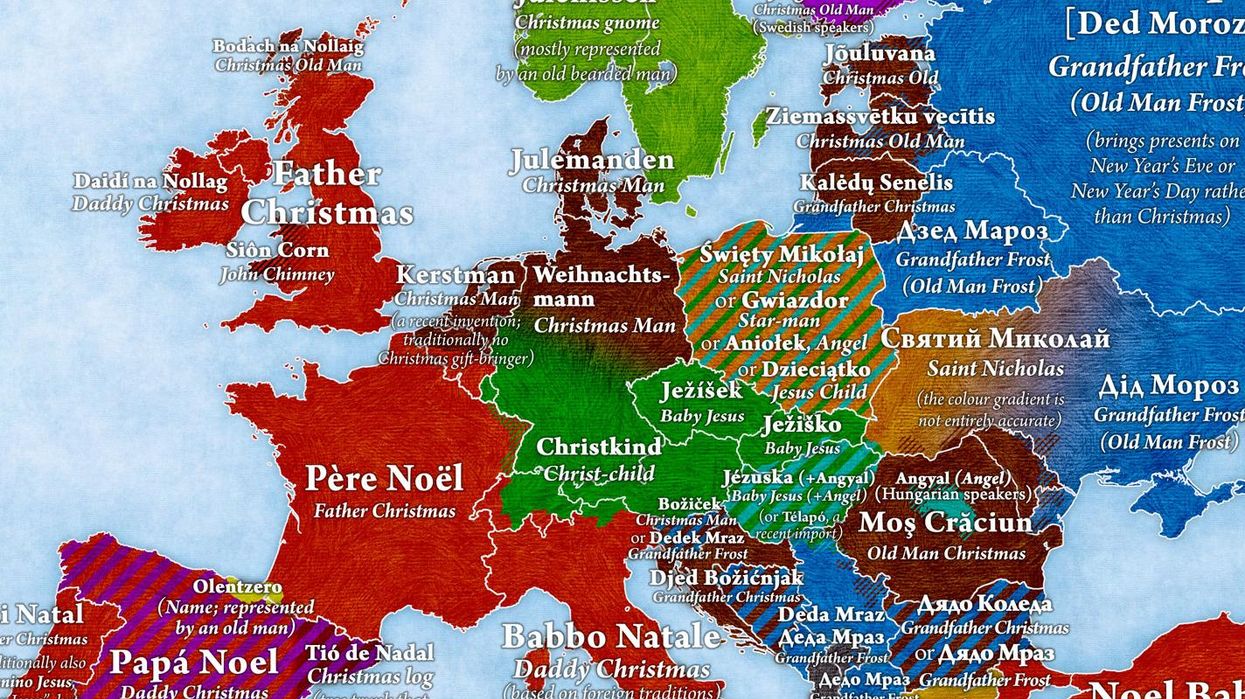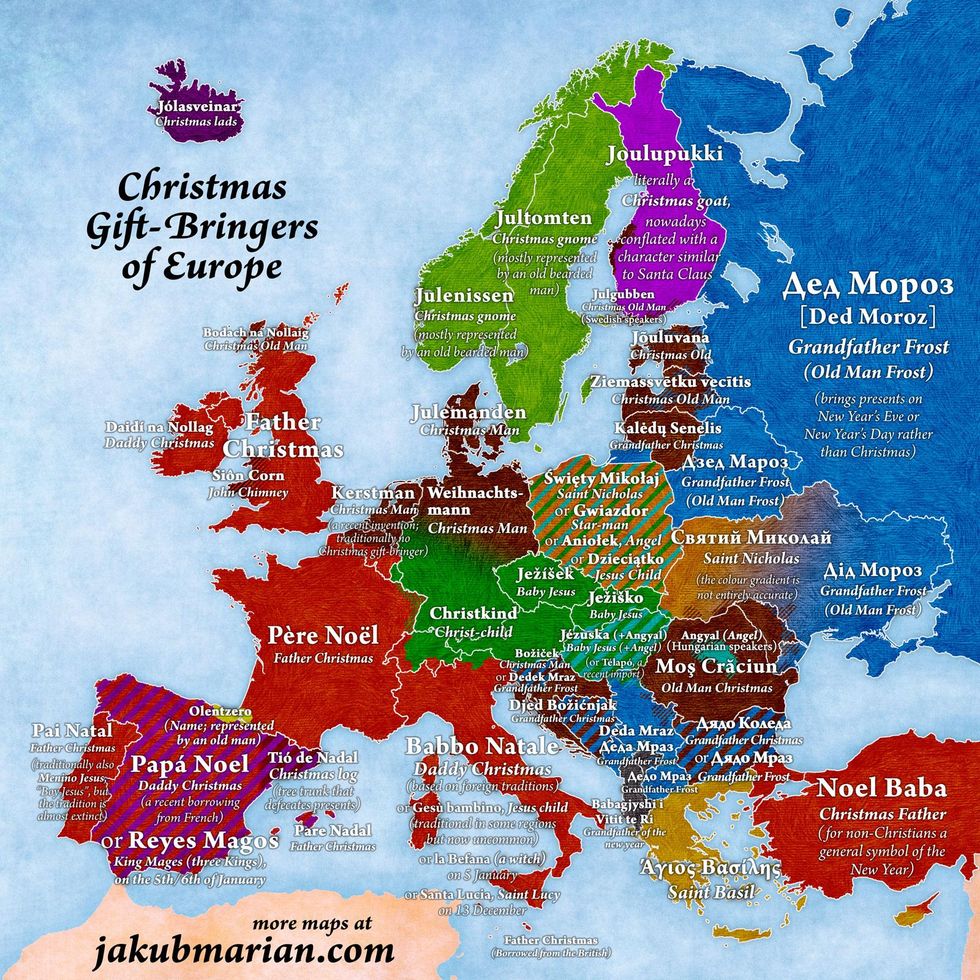Louis Dor
Dec 14, 2017

Picture:
Jakub Marian
If you're from the UK it's Father Christmas, not Santa Claus. No matter what the adverts try to tell you.
A version of this name dominates western Europe in different languages - the French have Père Noël, the Spanish have Papá Noel, the Italians have Babbo Natale and the Irish have Daidí na Nollag.
Other variants focus on 'Christmas Man' or on Jesus, as 'Christ-Child' or similar.
These different names also represent the different gift-bringers in European cultures.
For example, the Italians have La Befana, an old woman or witch who brings gifts to children on 5 January in a similar manner to the legend of St. Nicholas, Father Christmas.
She fills their socks with sweets and presents if they are good, or a lump of coal or dark coloured sweets if they've been bad - or in Sicily a stick in a stocking.
She appears in the Christian legend of the birth of Christ as a woman who the three wise men asked for directions. She put them up for the night and was known as the best housekeeper in the village (hence the witch's broom).
They asked if she wanted to join them to watch the birth of Christ, but she declined, saying she was too busy. She later had a change of heart and was unable to find them. The myth goes that she is still looking for the baby to this day.
You can browse the map, below, made by Czech Linguist, budding cartographer and Mathematician Jakub Marian, for a breakdown:

Here's the full list, written out:
Albania: Babagjyshi i Vitit te Ri, Grandfather of the new year
Austria: Christkind, Christ-Child
Belarus: Дзед Маро́з, Grandfather Frost (or the Russian version)
Belgium: In Dutch: Kerstman, Christmas Man, In French: Père Noël, Father Christmas
Bosnia: Djed Božićnjak, Grandfather Christmas or Djeda Mraz, Grandfather Frost
Bulgaria: Дядо Коледа, Grandfather Christmas or Дядо Мраз, Grandfather Frost
Croatia: Djed Božićnjak, Grandfather Christmas
Cyprus: Turkish: Noel Baba, Christmas Father, Greek: Άγιος Βασίλης, Saint Basil
Czech Republic: Ježíšek, Baby Jesus
Denmark: Julemanden, The Christmas Man
Finland: Joulupukki, literally Christmas Goat
France: Père Noël, Father Christmas
Germany: Weihnachtsmann, Christmas Man or Christkind, Christ-Child
Greece: Άγιος Βασίλης, Saint Basil
Hungary: Jézuska, Baby Jesus (with an angel), or Télapó, Winter Old Man
Iceland: Jólasveinar, Christmas lads
Ireland: Father Christmas
In Irish: Daidí na Nollag, Father Christmas
Italy: Babbo Natale, Daddy Christmas
Lithuania: Kalėdų Senelis, Grandfather Christmas
Latvia: Ziemassvētku vecītis, Christmas Old Man
Estonia: Jõuluvana, Christmas Old
Macedonia: Дедо Мраз, Grandfather Frost
Montenegro: Деда Мраз, Grandfather Frost
Netherlands: Kerstman, Christmas Man
Norway: Julenissen, literally Christmas gnome
Poland: Święty Mikołaj, Saint Nicholas; Gwiazdor, Star-man; Gwiazdka,Little Star; Aniołek, Angel; or Dzieciątko, Jesus Child (depending on region)
Portugal: Pai Natal, Father Christmas
Romania: Moş Crăciun, Old Man Christmas
Transylvania (Hungarian): Angyal, Angel
Russia: Дед Мороз, Grandfather Frost
Serbia: Деда Мраз, Grandfather Frost
Slovakia: Ježiško, Baby Jesus
Slovenia: Božiček, Christmas Man or Dedek Mraz, Grandfather Frost
Spain: Papá Noel, Daddy Christmas or Reyes Magos, Three Kings, In Catalonia: Tió de Nadal, Christmas log, In Basque: Olentzero (proper name, represented by an old man)
Sweden: Jultomten, literally Christmas gnome
Switzerland:, In German: Christkind, Christ-child, In French: Père Noël, Father Christmas, In Italian: Babbo Natale, Daddy Christmas
Turkey: Noel Baba, Christmas Father
Ukraine: Святий Миколай, Saint Nicholas or Дід Мороз, Grandfather Frost
United Kingdom: Father Christmas, In Welsh: Siôn Corn, John Chimney, In Scottish Gaelic: Bodach na Nollaig, Christmas Old Man
HT Jakub Marian
More: An eye-opening look at sexual consent ages around Europe, mapped
Top 100
The Conversation (0)













